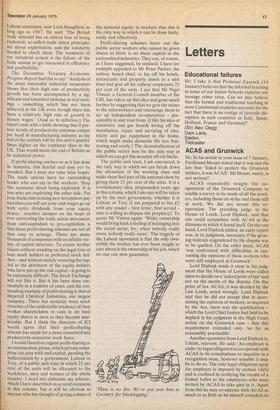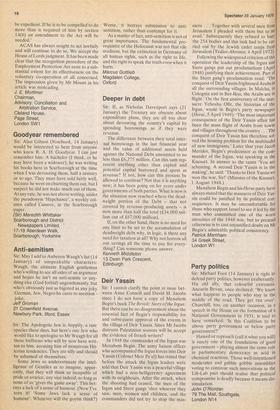ACAS and Grunwick
Sir: In his article in your issue of 7 January, Ferdinand Mount stated that it was not the law that 'failed to protect the Grunwick strikers, it was ACAS'. Mr Mount, surely, is not serious?
ACAS repeatedly sought the cooperation of the Grunwick Company to enable a survey to be made of all the workers, including those on strike and those still at work. We did not secure this cooperation. The presiding judge in the House of Lords, Lord Diplock, said that one could sympathise with ACAS in the dilemma in which it found itself. On the one hand, Lord.Diplock added, an early report was, in its judgment, necessary if the growing violence engendered by the dispute was to be quelled. On the other hand, ACAS 'was confronted with difficulties in canvassing the opinions of those workers who were still employed at Grunwick'.
Lord Diplock made it clear in his judgment that the House of Lords were called upon to decide on a 'naked point of law' and not on the merits of the dispute. On this point of law ACAS, it was decided by the Law Lords, acted wrongly. Lord Diplock said that he did not accept that in ascertaining the opinions of workers, as required by the Act, there was the qualification — which the Lord Chief Justice had held to be implicit in his judgment in the High Court action on the Grunwick case — that this requirement extended only `so far as reasonably practicable'.
Another quotation from Lord Diplock is, ',think, relevant. He said: 'An employer is under no legal obligation to co-operate with ACAS in its consultations or inquiries in a recognition issue, however sensible it may be to do so. The only legal obligation upon the employer is imposed by section 14(6) and is confined to notifying the results of a formal ballot to his employees who were invited by ACAS to take part in it. Apart from this he may co-operate with ACAS as much or as little as he himself considers to be expedient. If he is to be compelled to do more than is required of him by section 14(6) an amendment to the Act will be needed.'
ACAS has always sought to act lawfully and will continue to do so. We accept the House of Lords judgment. It has been made clear that the recognition procedure of the Employment Protection Act rests to a substantial extent for its effectiveness on the voluntary co-operation of all concerned. The impression given by Mr Mount in his article was misleading.
J. E. Mortimer Chairman, Advisory, Conciliation and Arbitration Service, Cleland House, Page Street, London SW1



































 Previous page
Previous page